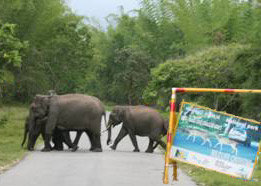Private elephants
Privatization has been proposed, debated or used in a surprising range of situations. It may help to prevent soil loss (through the privatization of land), overuse of water (through a rational system of pricing water), and ocean conservation (through managed fisheries).
One criticism of privatization as a solution to the commons problem is that it is easy to use privatization as an excuse for the-rich-grabbing-common-resources-from-the-poor. That situation caused widespread misery during the enclosures in England, and it has underlain relations between colonizing governments and native peoples from America to the Australian Outback. Even Hardin felt a need to justify it:
Injustice is preferable to total ruin.
I would like to think that Hardin was not condoning the use of privatization to perpetrate injustices in the name of Western Civilization -- and probably he wasn't. But like I said at the beginning, he is a very controversial guy, so I don't want to make any assumptions.
I do believe that privatization can be done right, although that can take some surprising forms.
Consider, for example, the endangered Asian elephant. The Asian elephant’s numbers have dwindled in the last few decades due to poaching and habitat destruction. In many areas, the encroachment of development and the shrinking of elephant habitat have meant more human-elephant contact and conflict. Traditional conservation has revolved around the idea of creating preserves for elephants-- essentially, setting aside areas for elephant, rather than human use.
 I don't know about you, but I tend to think of elephants as majestic and gentle creatures. But where humans and elephants come into conflict over habitat, elephants become a powerful force of nature. To the people living around them, elephants are a nuisance, or worse. Elephants trample crops, dwellings, and even humans, and they can make it through most fences (unless the fences are electrified). One elephant can devour a family's entire food supply in a single night. So, rural communities are only likely to support large elephant populations if they see those elephants as valuable to the community -- in other words, in their best interests. And setting aside land for elephants does not serve the interests of the community -- in fact, it takes land away from them.
I don't know about you, but I tend to think of elephants as majestic and gentle creatures. But where humans and elephants come into conflict over habitat, elephants become a powerful force of nature. To the people living around them, elephants are a nuisance, or worse. Elephants trample crops, dwellings, and even humans, and they can make it through most fences (unless the fences are electrified). One elephant can devour a family's entire food supply in a single night. So, rural communities are only likely to support large elephant populations if they see those elephants as valuable to the community -- in other words, in their best interests. And setting aside land for elephants does not serve the interests of the community -- in fact, it takes land away from them.
So, more recently, conservationists have had some success using a new approach called community-based conservation. In effect, the local communities become the "owners" of habitat and elephants around them.
 The community can benefit by working to bring in tourists who want to see these magnificent beasts, profiting directly from “ecotourism” through the protection of the elephants. (At the same time, conservationists also help communities develop "elephant repellant" crops, as well as more sustainable agriculture to reduce habitat destruction).
The community can benefit by working to bring in tourists who want to see these magnificent beasts, profiting directly from “ecotourism” through the protection of the elephants. (At the same time, conservationists also help communities develop "elephant repellant" crops, as well as more sustainable agriculture to reduce habitat destruction).
Likewise, in South Africa, the government commercialized white rhinos by selling them to private land owners as an attraction to draw crowds for both hunting and non-consumptive safaris and photography.
Copyright University of Maryland, 2007
You may link to this site for educational purposes.
Please do not copy without permission
requests/questions/feedback email: mathbench@umd.edu